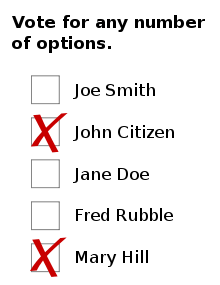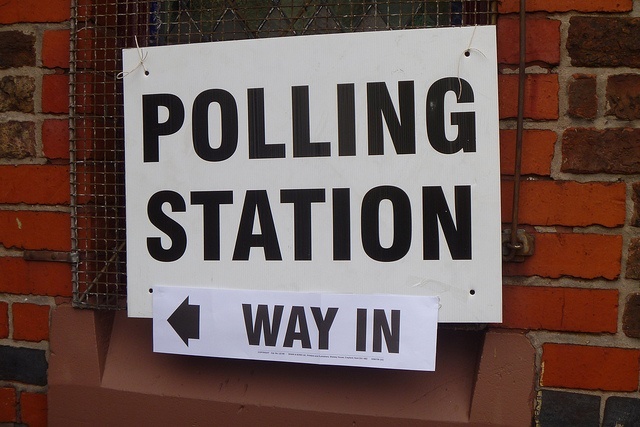
by Michael Ossipoff
Table of Contents:
1. Lesser-of-Two-Evils is Not Good Enough. Vote for What You Want.
2. Polling, to Inform and Guide Plurality Strategy.
3. Using a State Minor Office Election as a Test Election.
1. Lesser-of-Two-Evils is Not Good Enough. Vote for What You Want.
People voting Democrat always say that they’re voting for the lesser evil, to keep the candidate that they feel is the worst choice from winning, even though they don’t really like the Democrat; they’re doing it to avert the “disaster” of the Republican winning. But wait–doesn’t a Republican win every few years anyway? So, in actuality, the election of a Republican wouldn’t exactly be an unprecedented disaster.
Yes, we often hear that this time the Republican is worse than usual, and so this time we should make an exception and vote Democrat, to avert the disaster. Exception? It can’t really be called an exception when it’s what is claimed almost every time. And what would happen, if progressive voters, voting for what they actually want, make the Democrat lose, and the Republican wins?

That will show everyone, especially the Democrat lesser evil voters that the Democrat giveaway isn’t going to work anymore. The message to them will be: ‘We’re voting honestly. Why don’t you try it? .Because your lesser-evil compromise isn’t viable anymore, we won’t accept it.’ It would mark the end of the phony “two-party system”. Gore Vidal once said that we don’t have a two-party system. We have one party with two right wings.
An article in The Progressive magazine pointed out that the Democrat politicians talk (somewhat) like progressives during the campaign, but act like Republicans when in office. The article explained that this is because they get their votes from one segment of the population (the public), and their money and instructions from another (much smaller) segment of the population. Everyone knows that.
As I’ve said, each individual is isolated, made by the media to feel as if s/he is the only person who wants something better than the Democrats, convinced by the TV that the middle is really between Democrats and Republicans, and that every responsible person prefers the Democrat policies or the Republican policies. When a certain president said that single-payer national health insurance coverage for all wasn’t “viable”, Noam Chomsky said, “No, it isn’t viable, because only the people want it.”
If you look at some political party platforms, you might find that some of them will say and do everything that you want said and done, much better than the Republocrats (Republicans and Democrats) do. For instance, check out the platforms of the Greens. The G/GPUSA and the GPUS. Chances are that there is a party whose platform more closely matches what you want than the Republocrats does.
Contrary to what the TV tells us, the Democrats and Republicans don’t represent us. They represent those from whom they get their money. I spoke earlier of what would be the result if honest-voting progressives caused a Democrat to lose, and the Republican to win.
But let’s not assume that causing the Democrat to lose will necessarily cause the Republican to win. If those progressives are voting for someone they like, they might just be numerous enough to make that candidate win. Is that optimistic? Yes, that’s how you have to be when you vote. And that optimism will likely be reflected in the election-result.
The fact is that there is very little information on which to base a guess about who’d win if we all voted for what we want. But what little evidence there is suggests that that winner might very well be someone better than a Republocrat. I’d like to quote a few more sayings before finishing this section:
“If you vote for a lesser evil, you still get an evil.”
“It’s better to vote for what you want and not get it, than to vote for what you want and get it.”
2. Best Use of Plurality: Polling to Guide and Inform Plurality Strategy.
That’s one purpose of the two current ongoing polls at Democracy Chronicles. There should be as many such polls as possible, on as wide a scale as possible, preferably by ICT or (better yet) Symmetrical ICT. But Approval would be fine too. Or Score voting, preferred by some. But Approval is the most easily implemented of the excellent voting systems. For example, at Democracy Chronicles, our Approval poll is automated. The polling software that is already set up can often do Approval balloting.

For that reason, our Approval poll has gotten more than Eight times as many voters as our ICT rank-balloting poll has. Both methods should be used. The more polls the better. One consistent result in all of the polls is that the Republicans always finish at the bottom. That suggests that our favorite candidates can outpoll the Republicans, and we don’t need the Democrats to beat the Republicans.
When Ralph Nader use to run for president, he consistently won most of the Internet polls. Notice that when the official media polls ask about the candidates, they will usually say, ‘Whom would you vote for if the election were today?’ instead of ‘Which candidate do you like best?’ Could it be that the media and their pollsters don’t want to publicize what people actually want?
3. Using State Minor Offices as Test Elections
Why not, in each state, make an agreement that we’ll use some state minor office election (comptroller, etc.) as a test election? We make sure that all of the non-Republocrat parties run for that office (even if for no other office).
If people insist on voting Democrat for the major offices like Governor (to beat the Republican), then maybe they’ll be willing to vote for their favorite party or candidate-category, for that minor office. That, then, would give us an idea of how much support the non-Republocrat parties and candidate-categories really have. It might turn out that they aren’t really “minority parties” after all.
Anyway, before #2 and #3 have been successfully used, I strongly recommend #1: Just vote sincerely. Just vote honestly. Just say no to lesser evil giveaway voting. Don’t endorse what you don’t really like. Vote for what you want.

Richard Fobes says
I like Michael’s idea of voting for a third-party candidate for each state’s official in charge of elections. Here in Oregon that would be the Secretary of State. If other voters also agree to demonstrate this voting pattern, I’ll be happy to participate.
(Of course this approach would be counterproductive in “swing”/balanced states, such as Virginia, New Mexico, Florida, California, Texas, and a few others. I’m expressing support for voting for a third-party candidate where it will gain attention without sacrificing what remains of election fairness.)
Michael Ossipoff says
You said:
I like Michael’s idea of voting for a third-party candidate for each state’s official in charge of elections.
[endquote]
Thanks for the favorable words. Choosing the state elections official, as the office for use in testing parties’ winnability would be fine. The important thing is that it be an office that voters consider expendable, an office for which voters don’t care too much whether the Democrat loses to the Republican.
But why wait till others agree–If some are willing to try that, then, (even if you want to vote Democrat on the more major offices) there’s nothing stopping individuals from a more sincere party-choice on minor state offices. A few starting it could lead to it spreading, especially if those few can noticibly increase the alternative-party count-totals.
You said:
(Of course this approach would be counterproductive in “swing”/balanced states, such as Virginia, New Mexico, Florida, California, Texas, and a few others.
[endquote]
Why? You wouldn’t be letting the Republicans win your state’s electoral votes or Congressional seats. The whole point of it is that you’re only risking some minor state office. It’s for the voters who feel that the election of a Republican to congress or the presidency would be an unprecedented disaster (even though it happens every few years anyway).
You said:
I’m expressing support for voting for a third-party candidate where it will gain attention without sacrificing what remains of election fairness.)
[endquote]
Voting honestly for a change, whether for a minor state office, or for president this November, wouldn’t sacrifice any election fairness. But, if it at first elects a Republican, it might lead to an understanding that the resigned, pessimistic and cynical “lesser-evil” voting won’t work anymore, and that it’s time to try honest voting for a change. That, in turn, could lead to the end phony “2-party system” dependent on resigned and cowed giveaway voting.
But first, you’ll have to stop letting the media and the big campaign contributors tell you what your choices are.
But give it a try this November. Try voting honestly.
Michael Ossipoff
Steve Unger says
I think your argument for rejecting evil candidates (both lesser and greater) is right on target.
I would add the point that it isn’t even clear that we are better off with the lesser evil (LE) in office. When, as for example right now, the LE president virtually carries out the program of the GE, those who voted for the LE tend not to protest. In the current situation, the LE has gone beyond the GE with respect to trashing the Bill of Rights, and launching military attacks without even token congressional consent.
More on this, along with arguments similar to yours at:
https://www1.cs.columbia.edu/~unger/articles/voteBest.html (Should You Vote for the Best Candidate?)
Michael Ossipoff says
I’ve been away from the website for a few days, and I just found your reply today.
Exactly. It’s difficult to tell the lesser and greater evils apart by their actions in office.
As I was saying, the Democrats talk (somewhat) like progressives in campaigns, but act like Republicans in office, because they get their votes from one population-segment, and get their money and instructions from a different, smaller population-segment.
And, because there’s so little difference, why should be think we have to keep voting for one of them, in order to keep the other out?
To do so is to endorse and legitimize corruption, dishonesty, and illegal violence.
So whom should we vote for? When there are completely unacceptable candidates who could win, I call it a u/a election (for unacceptable/acceptable). In a u/a election, in Approval, we should approve all of the acceptables, and no one else.
But regrettably we don’t have Approval. We have Plurality. Pluralilty’s u/a strategy is: Vote for the acceptable candidate who is most able to win.
But Plurality, with its one vote, has an additional requirement: We progressives must all combine our votes on _one_ candidate. Preferably one who has been chosen based on what the paragraph before this one says.
I’m going discuss this in greater detail in an upcoming article, but I suggest that, this year, at this point, the most win-likely progressive candidate is Dr. Jill Stein. I personally prefer Roseanne Barr, a remarkably outspoken and straight-talking candidate. But, at this point, Stein, the GPUS (Greens) nominee is the most win-likely progressive.
So, to me the choice is obvious: This November, progressive voters, people who want something bette than the Democrats, should combine their votes on Dr. Jill Stein, the GPUS presidential nominee.
Remember: It’s better to vote for what you want, and not get it, than to vote for what you don’t want, and get it.
We should allow ourselves the honesty of voting for a platform &/or candidate that we like. If someone says that only the Republocrats ever win, remind them that maybe that’s because we all seem to think that we need to (reluctantly)vote for them.
Voting is _optimistic_! …or should be. Vote optimistically, and that optimism will be reflected in the outcome.
Michael Ossipoff
Adrian Tawfik says
Oh no! A Florida liberal who is not going to vote for Obama! Do you have ten tons of campaign material on your front door?
Michael Ossipoff says
Yes, no doubt soon my door will be well-decorated and with campaign flyers and door-hangers. And my neighborhood and town will be too. But we don’t have a tv, and rarely listen to radio news or commentary. (Of course during hurricane season, it’s necessary to have the radio on a little).
I heard that Jill Stein will be on the ballot here in Florida, as in most states.